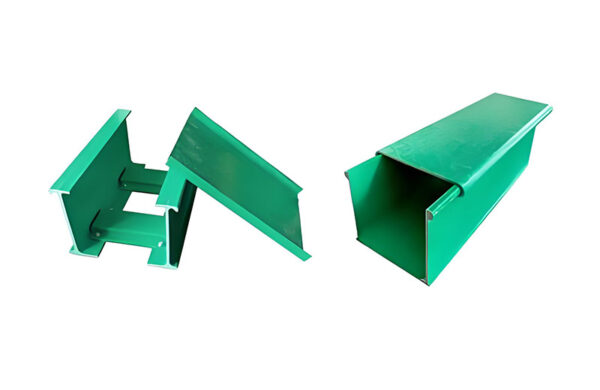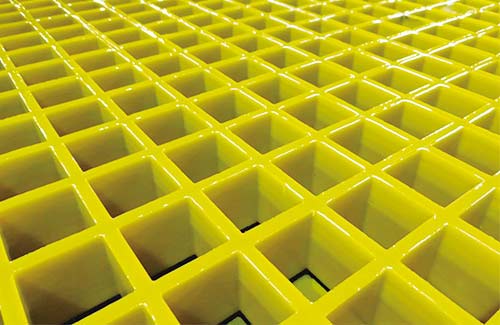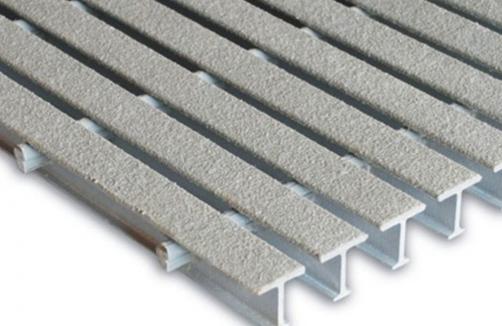Exploring the Benefits of Molded FRP Grating for Industrial Applications
Introduction
Industrial environments often require materials that can withstand heavy loads, harsh conditions, and corrosion. Fiber Reinforced Polymer (FRP) grating has emerged as a superior alternative to traditional materials like steel, aluminum, and concrete. Among the various types of FRP grating, molded FRP grating stands out due to its unique manufacturing process and exceptional performance. But what exactly makes molded FRP grating ideal for industrial applications? What are its key benefits? And how does it compare to other materials? This article explores these questions in detail.
What is Molded FRP Grating?

Molded FRP grating is a composite material made from a mixture of fiberglass and resin, which is then poured into a mold and cured under heat and pressure. This process creates a strong, rigid, and lightweight grid structure that combines the best properties of both materials. Unlike traditional FRP grating, which is often manufactured using pultrusion or compression molding, molded FRP grating offers enhanced durability and structural integrity.
Key Benefits of Molded FRP Grating
1. High Strength and Load-Bearing Capacity
One of the primary concerns in industrial settings is the ability of flooring materials to support heavy equipment and foot traffic. Molded FRP grating is engineered to withstand significant loads without bending or deforming. Its high strength-to-weight ratio makes it an excellent choice for platforms, mezzanines, and industrial walkways.
2. Corrosion and Chemical Resistance
Industrial environments often expose flooring to chemicals, oils, and moisture, which can cause rust, deterioration, or contamination. Molded FRP grating is highly resistant to corrosion, making it ideal for applications in chemical plants, marine facilities, and wastewater treatment plants. Unlike steel, it won’t rust or corrode over time.
3. Lightweight and Easy to Install
Despite its strength, molded FRP grating is significantly lighter than steel or concrete. This lightweight nature reduces the load on supporting structures, lowers shipping costs, and makes installation quicker and easier. Additionally, it can be cut to size on-site without the risk of splintering or breaking.
4. Non-Slip Surface
Safety is a critical concern in industrial settings. Molded FRP grating can be manufactured with a non-slip surface, reducing the risk of slips and falls. This feature is particularly important in areas where wet or oily conditions are common.
5. Longevity and Low Maintenance
Industrial flooring often requires frequent maintenance to replace damaged sections. Molded FRP grating has a long service life and requires minimal maintenance, saving time and money in the long run. Its durability means it won’t warp, crack, or require frequent repairs.
Comparing Molded FRP Grating to Traditional Materials
Steel vs. FRP Grating
While steel is a common choice for industrial flooring, it has several drawbacks. Steel is heavy, prone to rusting, and can conduct electricity, making it unsafe in certain environments. Molded FRP grating, on the other hand, is lighter, non-conductive, and won’t rust, offering superior performance in harsh conditions.
Concrete vs. FRP Grating
Concrete is another traditional material used for industrial flooring, but it is heavy, expensive to install, and prone to cracking. Molded FRP grating provides the same strength and durability as concrete but is lighter, easier to install, and more cost-effective over time.
Real-World Applications
Molded FRP grating is used in a wide range of industrial applications, including:
– Platform Decks – Providing safe and durable walkways in factories and warehouses.
– Marine Platforms – Withstanding saltwater exposure without corrosion.
– Chemical Plants – Resisting harsh chemical environments.
– Wastewater Treatment Facilities – Withstanding moisture and chemical exposure.
Sharing the Knowledge
If you’re involved in industrial construction or facility management, consider exploring molded FRP grating as a durable and cost-effective solution. Its benefits in strength, corrosion resistance, and ease of installation make it a standout choice for demanding environments. Share this information with your team or colleagues to help them make informed decisions about their flooring needs.
Conclusión
Molded FRP grating offers numerous advantages over traditional flooring materials, making it the ideal choice for industrial applications. Its high strength, corrosion resistance, lightweight design, and low maintenance requirements provide long-term value and safety for facilities. By understanding its benefits, you can make smarter choices for your next industrial flooring project.
If you have any questions about molded FRP grating or need recommendations for your specific application, feel free to reach out. We’re here to help you find the best solution for your industrial needs!







